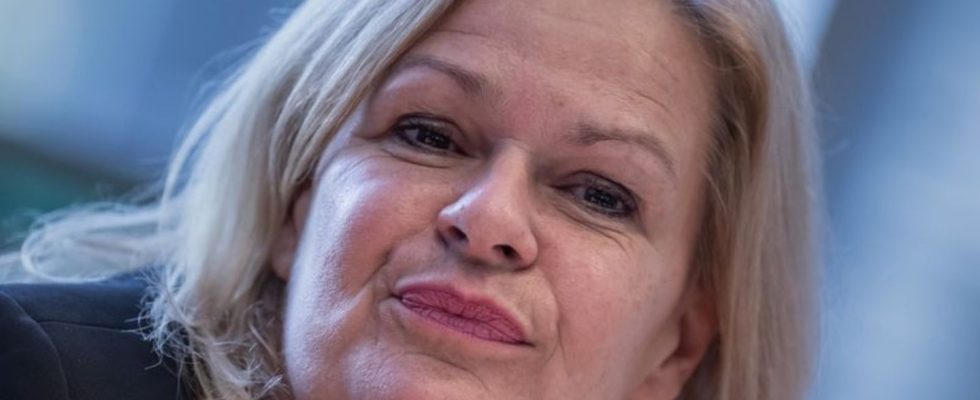migration
EU asylum reform: Germany wants to approve crisis regulation
According to Interior Minister Nancy Faeser (SPD), the federal government wants to pave the way for the controversial part of the EU asylum reform. photo
© Michael Kappeler/dpa
After considerable pressure from Brussels, the federal government now wants to accept the controversial crisis regulation. One party in particular has to give up.
After weeks of blockade, the federal government has expressed its opposition to a core element of the planned EU asylum reform abandoned.
Federal Interior Minister Nancy Faeser (SPD) announced today at an EU meeting in Brussels that the coalition of SPD, Greens and FDP agreed to a new text proposal for the so-called crisis regulation. “Although we still need to make further changes and beyond, we are living up to our responsibility today,” she explained.
Shortly before the EU consultations, Chancellor Olaf Scholz (SPD) had announced on Wednesday that the crisis regulation could no longer be blocked, according to government circles in the cabinet.
The rules are a central element of the planned EU asylum reform, which is intended, among other things, to limit unwanted migration. For example, if there is a particularly strong increase in migration, the period during which people can be held in prison-like conditions should be extended. In addition, the circle of people who are eligible for the planned strict border procedures could be increased.
In Brussels, the federal government had explained its rejection of the proposal for the regulation for weeks by saying that this set of rules could enable EU states to unacceptably lower protection standards for migrants. In Germany, Foreign Minister Annalena Baerbock and other Green Party politicians recently expressed fears that the crisis rules could create “incentives for large numbers of unregistered refugees to be forwarded to Germany.”
Tailwind for the election campaign in Bavaria and Hesse?
In the Council of EU Member States in Brussels, it was suspected that this argument could be connected to the upcoming state elections in Hesse and Bavaria, because this line had not played a role in the EU negotiations to date.
According to the plans for asylum reform, member states would have to register all arriving people even if there was a sharp increase in migration. A possible extension of deadlines for this would only be possible with the prior consent of the Council of Member States. The same applies to the weakening of protection standards. Even in a crisis situation, there are still a number of control options to prevent misuse.
Baerbock pointed out that a number of points were still able to be included in the text. She was criticized within the party in June because she had accepted the plans agreed at the time to tighten the regular asylum procedures.
The refugee and human rights organization Pro Asyl described the federal government’s decision as a “dramatic signal that human rights no longer play a role.” “While the traffic light government had resolved in the coalition agreement to end illegal pushbacks and the suffering at the external borders, it is now agreeing to a regulation that would massively tighten exactly this,” the organization said.
The compromise text
The basis of Faeser’s announcement was a slightly revised version of the original proposal for the crisis regulation by the Spanish EU Council Presidency. Above all, it should enable the German Greens not to make the approval seem like a major defeat.
According to the new text of the EU Council Presidency, for example, a rule was deleted that would have allowed EU countries to temporarily deviate from EU standards for material support services and access to medical care in the event of a large influx of people. In addition, applications for the protection of minors and their family members should be given priority, even in crisis situations. Stronger information and justification obligations are also planned for countries that want to make use of the regulation.
However, the bottom line is that the changes are not far-reaching. The original text would have stipulated that, even in crisis situations, Member States must cover the basic needs of applicants in areas such as food, clothing, adequate medical care and shelter “with full respect for human dignity”. The concern about an increased number of unregistered migrants being sent to Germany was also not explicitly addressed in the text.
Why time is of the essence
The planned asylum reform should take place as quickly as possible. Because time is of the essence: there are European elections in June next year. Projects that have not yet been negotiated with the governments of the member states could then be called into question again and be delayed for a long time.
In the case of the planned reform of the asylum system, this would be a particularly big setback. The project has been in the works for years. Right-wing parties in particular, such as the AfD, have long accused the EU of failing in the fight against illegal migration.
What happens next?
Before the meeting in Brussels, it was expected that German approval of the new text would be sufficient to formally adopt it. In the afternoon, however, it was still unclear whether the required majority would actually be achieved.

